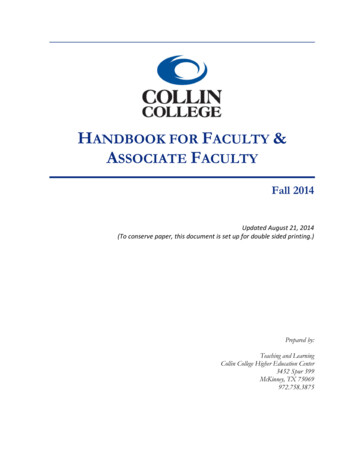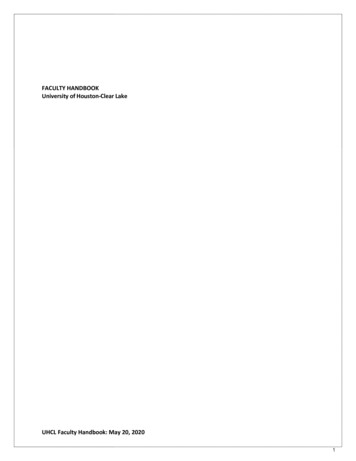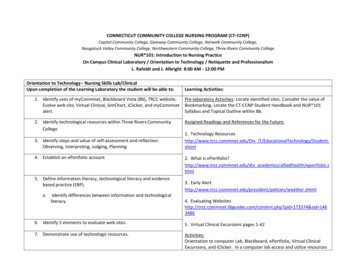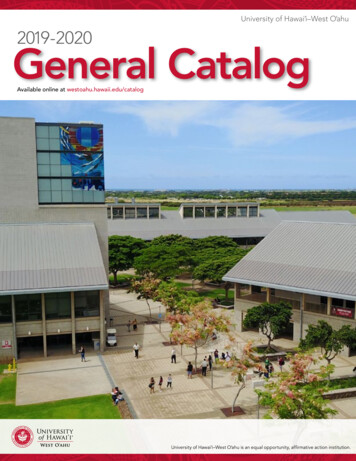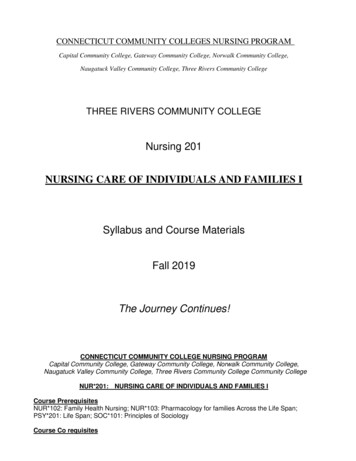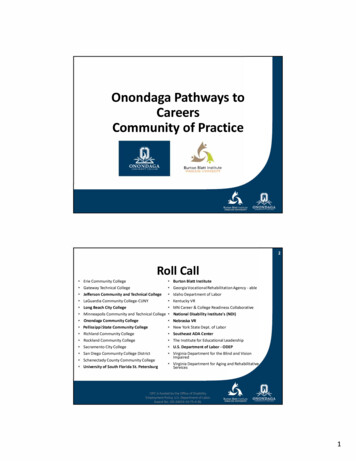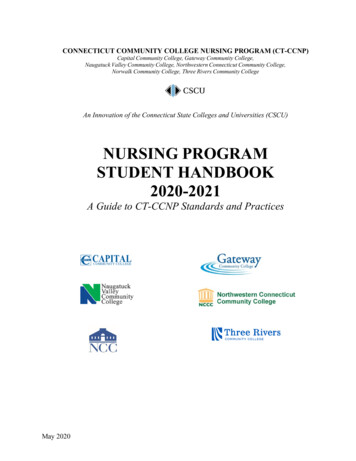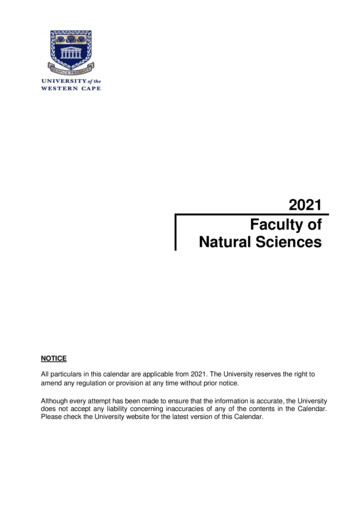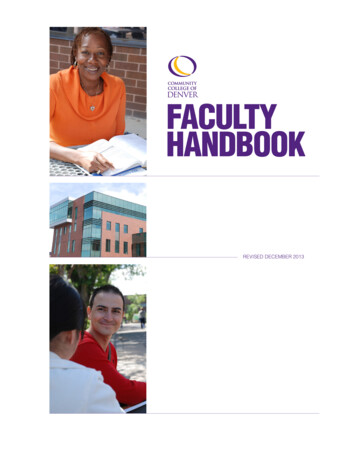
Transcription
FACULTYHANDBOOKREVISED DECEMBER 2013
TABLE OF CONTENTSFORWARD.4SECTION 1.0:. MISSION, GOVERNANCE AND ORGANIZATION1.1CCD Vision and Mission .61.2Colorado Community College System (CCCS) .61.3Colorado Commission on Higher Education (CCHE) .71.4College Governance (BP 2-30) .71.5State Governance (BP 2-30) .81.6Auraria Higher Education Center (AHEC) .81.7CCD Service Areas & Locations .8SECTION 2.0:. COLLEGE COMMITMENTS AND PRINCIPLES2.1CCD Commitment to Cultural Diversity and Pluralism .102.2CCD Commitment to Collegiality .102.3Equal Employment Opportunity/Affirmative Action Program .102.4Discrimination and Harassment .132.5Drug-Free Workplace (BP 3-24; SP 3-24).152.6Copyright and Patents (BP 3-90) .152.7Electronic Communication Policy .172.8Employee Code of Ethics (BP 3-70) .182.9Background Checks .182.10 General Computer & Information Systems Procedures.182.11 Employee Benefits .192.12 Paychecks .192.13 Faculty Additional Year, Post Retirement .19SECTION 3.0:. FACULTY EMPLOYMENT, EDUCATION REQUIREMENTS ANDCREDENTIALING STANDARDS3.1Minimum Standards for Hiring New Faculty .213.2Probationary/Provisional Faculty.223.3Minimum Standards for Entering Non-Probationary Status .233.4Minimum Standards for Continued Employment of Non-Probationary Faculty.233.5Annual Performance Plan .233.6Community College of Denver Professional Development Requirements .23SECTION 4.0:FACULTY LEVEL PLACEMENT, ADVANCEMENT AND COMPENSATION4.1Philosophy.264.2Initial Placement of New Hires .264.3Level Definitions .264.4Criteria for Advancement .264.5Procedures for Advancement .274.6Overload and Supplemental Assignments .274.7Summer Assignment .274.8Annual Salary Adjustment Objectives .284.9Faculty Pay Plan Procedures (BP 3-55) .28SECTION 5.0:. FACULTY JOB DESCRIPTIONS5.1Full-Time Faculty Job Description .315.2Faculty Coordinator/Chair Responsibilities.322
TABLE OF CONTENTSSECTION 6.0:. FACULTY WORKLOAD6.1Full-Time Faculty Workload Policy .356.2Faculty Workload and Employment Conditions Committee .386.3Part-Time/Adjunct Faculty Workload and Assignments .406.4Community College of Denver Adjunct Faculty Job Description .40SECTION 7.0:. FACULTY DUE PROCESS, GRIEVANCE POLICY AND PROCEDURES7.1Due Process for Faculty .447.2Peer Review Process for Faculty .49SECTION 8.0:. FACULTY BENEFITS OVERVIEW (BP 3-60)8.1Overview of Benefits .528.2Additional Year, Post Retirement .55SECTION 9.0:. INSTRUCTIONAL POLICIES AND PROCEDURES9.1Curriculum Policies and Procedures .579.2Instructional Programs .589.3Class Scheduling .599.4Student Field Trips .609.5Student Evaluation Policies and Procedures .609.6Teaching and Learning Center .699.7Communication with Students .69SECTION 10.0:. FACULTY PERFORMANCE APPRAISAL10.1 Philosophy and Purpose .7110.2 Faculty Performance Appraisal Flowchart .7210.3 Annual Performance Appraisal Process.7310.4 Appraisal of Job Performance .7610.5 Performance Development Plan .7910.6 Potential for Non-renewal .7910.7 Performance Appraisal Appeal .7910.8 Compensation & Reward for Faculty Performance .80APPENDICESATeaching & Learning Values/Critical Skills/ Learning College Principles .81BGoal Setting Guidelines .83CAnnual Faculty Performance Plan .84DFaculty Self-Reflection Guidelines .85EStudent Evaluation .86FClassroom Observation Report Form .87GFactors in Appraisal of Faculty Performance .89HFaculty Job Description .90IFaculty Chair/Coordinator Job Description .92JAnnual Faculty Performance Appraisal Report .94KStandards of Academic Progress .95LAcademic Integrity Policy .97MAmericans with Disabilities Act .100NStudent Rights, Freedoms & Code of Conduct .101OVoice: The Influence of Faculty in the CCD Decision-Making Process .1053
FOREWORDThis Faculty Handbook (Handbook) contains pertinent information regarding the CommunityCollege of Denver’s (College or CCD) policies, procedures and regulations that affect facultymembers. Faculty members are expected to be familiar with College policies and proceduresand with the contents of this Handbook.Changes to policies and procedures affecting faculty may be initiated by the College or byofficials of the Colorado Community College System (CCCS) or its governing body, the StateBoard of Community Colleges and Occupational Education (SBCCOE or State Board). Ifchanges are made, these will be reflected in additions or deletions to this Handbook and will bedistributed to all faculty members. In all cases, Board Policies (BP) shall supersede thisHandbook and any other College policies, procedures or regulations.It should be understood that College and/or State Board policy, procedure and regulation changesmight occur at any given time. In the event of changes, the approved policy, procedure, orregulation shall supersede the information contained herein. To access BPs and SystemPresident Procedures (SPs), see http://www.cccs.edu/SBCCOE/SBCCOE.html.Nothing in this Handbook is intended to create (nor shall be construed as creating) an express orimplied contract of employment or to guarantee employment for any term or to promise that anyspecific procedures must be followed by the College. The College reserves the right to modify,change, delete or add to, as it deems appropriate; the policies, procedures, benefits and othergeneral information in this Handbook.4
SECTION 1COLLEGE MISSION, GOVERNANCE AND ORGANIZATION5
Section 1College Mission, Governance and OrganizationSECTION 11.1COLLEGE MISSION, GOVERNANCE AND ORGANIZATIONCCD VISION STATEMENTEvery member of our community will attain the education he or she desires.CCD MISSION STATEMENTCCD provides our diverse community an opportunity to gain quality higher educationand achieve personal success in a supportive and inclusive environment.CCD VALUES InvolvementStudent-FocusIntegrityLife-Long LearningExcellenceHealthy Work EnvironmentCCD Goals for 2013-14 Increase CCD retention, completion and transfer rates.Connect students to CCD support programs and resourcesSupport student achievement of CCD’s institutional outcomes.Develop and improve relationships within our community.[1.1 above is taken from CCD’s 2013-14 Catalog; see current catalog at www.ccd.edu forupdates and/or changes.]1.2COLORADO COMMUNITY COLLEGE SYSTEM (CCCS)(REFERENCE BP 2-40)CCD is one of 13 community and junior colleges in the Colorado Community CollegeSystem (CCCS or the System) and is accredited by The Higher Learning Commission ofthe North Central Association of College and Schools (NCA).The System is governed by the nine-member State Board for Community Colleges andOccupational Education (SBCCOE). The State Board is unique in the nation, withresponsibility for both secondary and post-secondary career and technical education andcommunity college governance. Members are appointed by the Governor and confirmedby the State Senate for staggered four-year terms. One community college facultymember and one student representative serve in non-voting capacities for one year each.The CCCS (System) President serves as the Director of Community Colleges andDirector of Occupational Education. The System Vice Presidents, as well as the state6
Section 1College Mission, Governance and Organizationsystem community college presidents, report to the President of the System who, in turn,reports to the SBCCOE.For more information about CCCS or SBCCOE, see: http://www.cccs.edu.1.3COLORADO COMMISSION ON HIGHER EDUCATION (CCHE)The Colorado Commission on Higher Education (CCHE), an agency within theDepartment of Higher Education (DHE), is the central policy and coordinating board forpublic higher education in the state of Colorado. CCHE serves as a bridge between theGovernor, the General Assembly and the governing boards of the state-supportedinstitutions of higher education. Eleven commissioners oversee the state’s system ofhigher education, working with one constitutional and five statutory governing boards.By statute, CCHE is responsible for the following: Higher Education Finance and AppropriationsAcademic Programs and System-Wide PlanningCapital Construction and Long-Range PlanningThe governing boards and institutions of the public system of higher education inColorado are obligated to conform to the policies set by the Commission within theauthorities delegated to it in statute (C.R.S. 23-1-1022). For more information aboutCCHE, see http://www.state.co.us/cche.1.4COLLEGE GOVERNANCE(REFERENCE BOARD POLICY BP 2-30)In accordance with BP 2-30, each college president ensures that their college has afaculty forum through which all faculty members will be provided an opportunity tocommunicate and actively participate in the making of decisions regarding matters thataffect them. At CCD, this body is referred to as Faculty Council.According to the by-laws of Faculty Council, the membership is comprised of two votingfaculty members from each Center, one voting adjunct faculty member (representingAdjunct Faculty Senate) and one voting at-large faculty member. These Center membersare voted into Faculty Council by the full-time faculty in their respective Centers. Theadjunct faculty representative is elected by the members of the Adjunct Faculty Senate.Each year Faculty Council elects a chairperson who will oversee the council and serve asa communication link with the President and Executive Staff of the College. Faculty are encouraged to participate in the decision-making processes at CCD byproviding input to their Faculty Council representative(s) regarding any College mattersthat concern them. Faculty Council will distribute a list of current representatives to allfaculty members at the beginning of each academic year.7
Section 11.5College Mission, Governance and OrganizationSTATE GOVERNANCE(REFERENCE BP 2-30)In accordance with BP 2-30, a State Faculty Advisory Council (SFAC) will serve in anadvisory capacity to the Board and to the President of the system and will act as a liaisonbetween the college faculty and the State Board.The SFAC membership will be comprised of one regular (full-time) faculty member fromeach state system community and junior college. At CCD, Faculty Council selects itsSFAC representative at the beginning of each academic year. Faculty may contact theircouncil representative(s) for more information.1.6AURARIA HIGHER EDUCATION CENTER (AHEC)CCD’s main campus is located on the Auraria Campus in downtown Denver. Auraria isthe largest college campus in Colorado, where three separate higher education institutionsenroll in excess of 40,000 students. The Community College of Denver, MetropolitanState University of Denver and the University of Colorado at Denver share classroomspace and general services on the commuter campus. The University of Colorado Denveroperates the Auraria Library with support from both Metro State and CCD.The Auraria Higher Education Center (AHEC), a fourth entity on the Auraria campus,manages campus facilities and non-academic functions, including the campus bookstore,Auraria Early Learning Center, classroom and event scheduling and Auraria CampusPolice Department. For more information about AHEC, see http://www.ahec.edu.1.7CCD SERVICE AREA AND LOCATIONSCCD serves the educational needs of many individuals, organizations and businesses inthe City and County of Denver. It is a leading point of access to higher education formany first-time college enrollees in the metro area. CCD also offers concurrentenrollment instruction in partnership with Denver Public Schools (DPS) in many DPShigh schools, DPS’ Career Education Center (CEC) and a DPS charter school, SouthwestEarly College (SEC).The Lowry site, in southeast Denver, houses CCD’s Health Sciences Center. CCD’sFoundational Skills Institute offers one of the largest GED instructional programs in thestate, with sites throughout the City and County of Denver.8
SECTION 2COLLEGE COMMITMENTS AND PRINCIPLES9
Section 2College Commitments and PrinciplesSECTION 22.1COLLEGE COMMITMENTS AND PRINCIPLESCCD COMMITMENT TO CULTURAL DIVERSITY AND INCLUSIONCCD believes all students are entitled to a quality education that offers studentsopportunities to develop understanding and appreciation of our interdependence asindividuals and nations.Education must be meaningful to all students. In addition, it must provide students,faculty and staff with an understanding of cultural pluralism. To that end, CCD providesan educational environment that fosters cultural diversity, international understanding andglobal awareness.CCD recognizes that such an environment can exist only with an administration, facultyand staff that reflect the cultural diversity of its students. Therefore, the administrationunconditionally endorses affirmative action.2.2CCD COMMITMENT TO COLLEGIALITYCCD is committed to the spirit of open dialogue and participation by all of its constituentgroups in the decision-making processes of the college. CCD will treat its faculty andstaff with respect and make good faith efforts to communicate information aboutprograms and policies that are of general interest to the CCD community. The CollegePresident, Provost and Vice Presidents maintain an open door policy to hear all mattersthat affect the college, employees and students.2.3EQUAL EMPLOYMENT OPPORTUNITY/AFFIRMATIVE ACTIONPROGRAM(REFERENCE BP 3-120, SP 3-120b)POLICY STATEMENT:CCD does not discriminate on the basis of race, color, creed, national origin, sex, sexualorientation, age or disability in admission or access to, or treatment or employment in itseducational programs or activities. Inquiries or complaints should be directed to theCollege’s Director of Human Resources at 303-352-3037 concerning Title VI, Title IXand Section 504 may be referred to the Vice President for Student Affairs, Campus Box212, Community College of Denver, P.O. Box 173363, Denver, CO 80217-3363,303-352-3046 or the Office for Civil Rights, U.S. Department of Education, 1244 SpeerBoulevard, Suite 310, Denver, Colorado 80204-3582, 303-844-5695.The Board recognizes that the quality of instruction and educational opportunities for allare enhanced when the diversity of the community served is represented in the studentpopulation and workforce. The Board also recognizes that women and minorities havebeen historically underutilized in the higher education work force.CCD has an Equal Employment Opportunity/Affirmative Action (“EEO/AA”) Programthat promotes diversity and remedies underutilization of women and minorities.10
Section 2College Commitments and PrinciplesEVALUATION OF AFFIRMATIVE ACTION:Compliance with this policy and the EEO/AA Program developed hereunder shall be afactor for consideration in the evaluation of the performance of System employees.PROCEDURE:Consistent with BP 3-120, the System hereby establishes the following EqualEmployment Opportunity/Affirmative Action Program:Goal #1:Colleges will take appropriate action to ensure that the racial and ethnicdiversity of their student bodies reflects the racial and ethnic diversity oftheir respective service areas.Each institution not currently enrolling students consistent with thedemographics of its service area will establish its own goals when thedisparity is significant (greater than 5% of total) and develop andimplement strategies to accomplish the goal.Goal #2:Each college shall ensure that its educational services and practicesencourage all students to remain at the institution until they havecompleted their educational objectives.Each institution shall identify problems with retaining and graduating anyidentifiable group of students and develop and implement strategies toresolve these problems.Goal #3:All colleges shall initiate/ maintain activities designed to enhanceharmony for all who work and study on campus to improve the quality ofeducational opportunities for all.Colleges shall recognize and celebrate diversity through their activities,environment and enrichment to the curriculum.Goal #4:The composition of the staff at each college and at the System officeshould reflect the qualified racial and ethnic mix of the area from whichapplicants are recruited.Each institution not currently hiring employees consistent with this goalwill develop and implement strategies to resolve the underutilization.Goal #5:Educational services at each college and the employment practicesthroughout the System should be sensitive to the needs of individuals withphysical or mental impairment and reasonable efforts should be made toaccommodate such needs.Each college shall identify problems it has with providing access toeducational services and employment to persons with disabilities anddevelop and implement strategies to resolve them.11
Section 2College Commitments and PrinciplesCollege presidents shall develop, in consultation with the college community, plans toattain the goals of the System EEO/AA program. These revised plans are to be submittedto the System President on or before April 15, for Board approval at its May meeting.Thereafter, each president will report annually to the System on institutional progress inmeeting these goals.The CCD Diversity and Inclusion Council, formed in January of 2012, celebrates the strengthsof our diversity and promotes inclusion among staff, faculty and students at CCD. Every memberof the Diversity and Inclusion Council is committed to these core values. We invite all membersof the CCD community to embody our mission. Value Voice - (Environmental Engagement subcommittee)Offer a safe, trusting and comfortable zone and culture of integrity to foster respectfuldiscussions of diversity-related issues and concerns. Provide a platform to engage inrespectful and honest conversations related to diversity, inclusion, and “CourageousConversations". Enhance an inclusive environment rooted in value, honor and respecttowards ALL colleagues and students campus-wide.Value Culture - (Celebrate Diversity subcommittee)Celebrate and draw awareness to the unique differences of CCD’s community throughunity in voice and cultural representation. Serve as a campus resource and support ofexisting multicultural events and activities.Value Community - (Community Partnerships subcommittee)Develop and cultivate community partnerships by connecting education withorganizations, business and industry within the Denver-metro community. Drawawareness and exposure to socio-economic student situations. Discuss all facets ofdiversity openly with partners. Facilitate student-to-industry mentor and internopportunities.The Board does not have a policy that mandates the use of search committees. If there is arequirement for such committees in college or system staff policies and procedures, thecollege/system president is hereby authorized to waive such requirement in order to attain thegoals and objectives described above.12
Section 22.4College Commitments and PrinciplesDISCRIMINATION AND HARASSMENT (REFERENCES BP 3-120, BP 4-120,SP 3-50b, SP 3-70, SP 4-31a, HR-7, HR-8 and HR-9)BASISBoard Policy (BP) 3-120 and BP 4-120 provides that Employees and students shall not besubjected to unlawful discrimination and/or harassment on the basis of sex/gender, race,color, age, creed, national or ethnic origin, physical or mental disability, veteran status,pregnancy status, religion or sexual orientation in employment conditions or educationalprograms or activities. The following information contains excerpts from HR-9; refer toHR-9 for complete information.DEFINITIONSDiscrimination is any distinction, preference, advantage for or detriment to an individualcompared to others that is based upon an individual’s actual or perceived sex/gender,race, color, age, creed, national or ethnic origin, physical or mental disability, veteranstatus, pregnancy status, religion or sexual orientation that is so severe, persistent orpervasive, and that unreasonably interferes with or limits: Employee’s employment conditions or deprives the individual of employmentaccess or benefits.Student’s ability to participate in, access, or benefit from the College’seducational program or activities.Authorized volunteers’ ability to participate in the volunteer activity.Guests and visitors’ ability to participate in, access, or benefit from the College’sprograms.Discriminatory harassment is detrimental action based on an individual’s actual orperceived sex/gender, race, color, age, creed, national or ethnic origin, physical or mentaldisability, veteran status, pregnancy status, religion or sexual orientation which is severe,persistent or pervasive that it unreasonably interferes with or limits: Employee’s employment conditions or deprives the individual of employmentaccess or benefits.Student’s ability to participate in, access, or benefit from the College’seducational program or activities.Authorized volunteers’ ability to participate in the volunteer activity.Guests and visitors’ ability to participate in, access, or benefit from the College’sprograms.Sexual harassment is unwelcome, gender-based verbal or physical conduct that issufficiently severe, persistent or pervasive that it has the effect of unreasonablyinterfering with, denying or limiting someone the ability to participate in or benefit fromCCD’s educational program and/or activities, or work activities, and the unwelcomebehavior may be based on power differentials (quid pro quo), the creation of a hostileenvironment, or retaliation.13
Section 2College Commitments and PrinciplesRetaliatory harassment is any adverse employment or educational action taken against aperson because of the person’s perceived participation in a complaint or investigation ofdiscrimination and/or harassment based on federal or state civil rights laws.EMPLOYEE’S OBLIGATION TO REPORTCCD Employees have an ethical obligation to report any incidences they are aware ofconcerning discrimination and/or harassment. If the employee is unsure, s/he may directtheir questions to the College’s Director of Human Resources. Failure to report will beconsidered a violation of BP 3-70 Colorado Community College System Code of P3-70.pdf, and may result indiscipline, up to and including termination.REPORTING A COMPLAINTIn order to take appropriate corrective action, CCD must be aware of discrimination,harassment and related retaliation that occurs in CCD employment and educationalprograms or activities. Therefore, anyone who believes s/he has experienced or witnesseddiscrimination, harassment or related retaliation should promptly report such behavior tothe Title IX/EO Coordinator:Rhonda PylicanDirector of Human ResourcesTitle IX and EO CoordinatorAdministration Building, Room 310Telephone: (303) 352-3037Email: rhonda.pylican@ccd.eduCOLLEGE AS COMPLAINANTAs necessary, the College reserves the right to initiate a complaint, to serve ascomplainant, and to initiate conduct proceedings without a formal complaint by thevictim of misconduct.COMPLAINT PROCESSWhen the accused party (respondent) to a discrimination and/or harassment complaint isan administrator/professional technical employee(s), faculty and adjunct instructor(s),classified employee(s), authorized volunteer(s), guest(s) or visitor(s) within the ColoradoCommunity College System (CCCS) System President’s Procedure (SP) 3-50b willapply, as adopted by the Community College of Denver (College or CCD) in HumanResources Procedures HR – 9.When the respondent to a discrimination and/or harassment complaint is a student withinCCCS, SP 4-31a will apply as adopted by CCD in Human Resources Procedures HR – 8.When the complainant alleges sexual misconduct, SP 3-120a (Employee(s), authorizedvolunteer(s), guest(s), or visitor(s)) or SP 4-120a (Students) will apply, as adopted byCCD in Human Resources Procedures HR – 7.14
Section 2College Commitments and PrinciplesRETALIATORY ACTSIt is a violation college procedure to engage in retaliatory acts against any Employee or studentwho reports an incident of discrimination and/or harassment, or any Employee or student whotestifies, assists or participates in a proceeding, investigation or hearing relating to suchallegation of discrimination and/or harassment.2.5DRUG-FREE WORKPLACE(REFERENCE BP 3-24, SP 3-24)A. POLICY STATEMENT:The unlawful manufacture, distribution, dispensation, possession, or use of acontrolled substance is prohibited in the workp
CCD's main campus is located on the Auraria Campus in downtown Denver. Auraria is the largest college campus in Colorado, where three separate higher education institutions enroll in excess of 40,000 students. The Community College of Denver, Metropolitan State University of Denver and the University of Colorado at Denver share classroom

